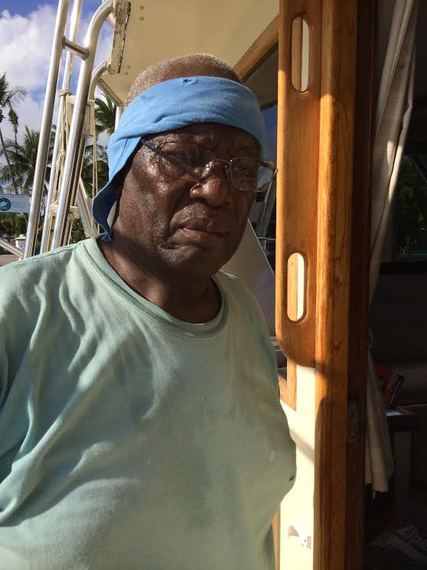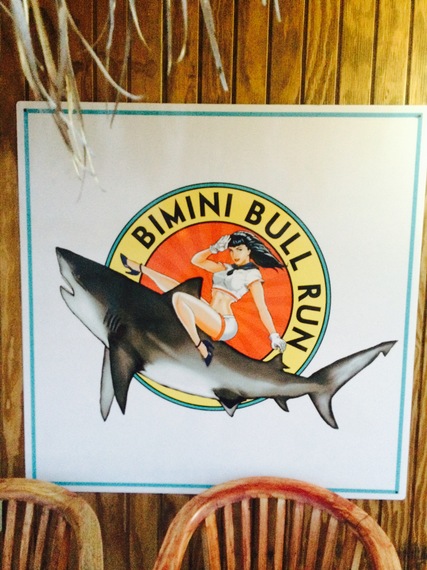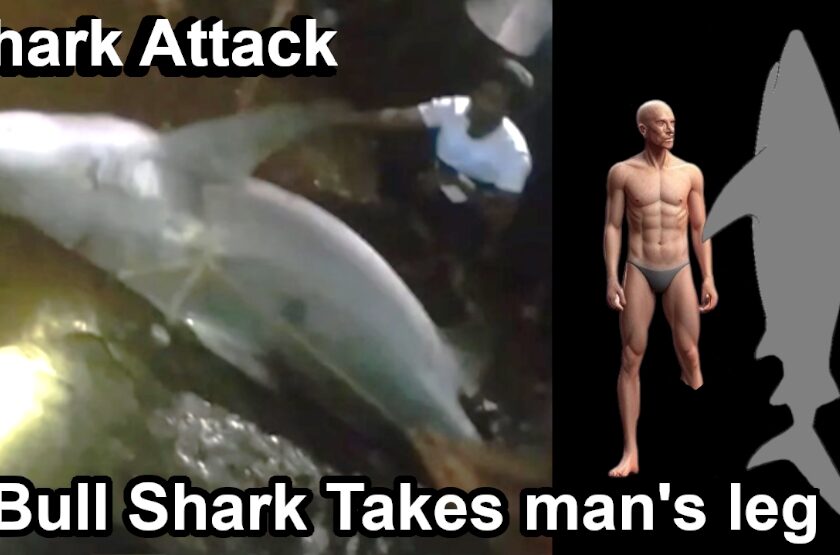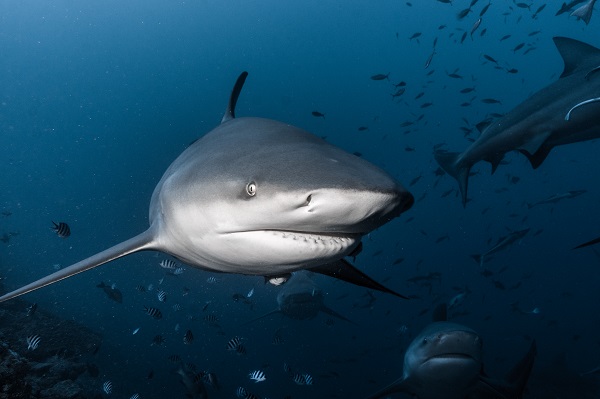“Look at those big fellas, ” remarked my old friend James Rolle as we sat with feet dangling off a beat-up dock at the Big Game Fishing Club on Bimini, a small island in the Northern Bahamas. Jimmy and I were staring into the clear turquoise water a few feet below watching two bull sharks prowling between the weathered pilings of the dock looking for something to eat. Each of them weighed between three- and four-hundred pounds. Bulls are pugnacious fearless hunters that account for more attacks on humans than any other species of shark including great whites. Here were two of them hunting in the picturesque marina where tourists often jump in for a refreshing dip in the hot afternoon. I’ve often done this myself.
James Rolle, is a balding, large-bellied, deeply considerate man, just north of seventy. He was a sport fishing legend back in the day when it was considered heroic to troll big seas for huge marlin and blue fin tuna and to pull them in the boat and bring them back to the dock for tourists to gawk at. Fifty years ago, many anglers believed that game fish were limitless. We killed trophy fish without regret while trolling the oceans to find exotic hunting pleasure of the kind that Hemingway wrote about in sensuous lasting prose. Now years of overfishing mostly by commercial fishermen has gravely reduced the population of pelagic fish worldwide endangering the survival of many species including marlin, tuna and sharks, which are much coveted by the Chinese who use fins for soup. Chinese fishing boats pull sharks on board, cut off their fins and then roll the maimed creatures back into the ocean to die slowly and miserably.
Jimmy and I have been friends for half a century. He is a gifted storyteller and likes to recall days, not so long ago, when big game fish proliferated just offshore of Bimini like the vast buffalo herds on the Western plains. His story telling voice fell into the soft cadences of island music: “One morning these two guys come down to Weeches’ dock lookin’ to go marlin fishin’. It was 1962 and I was runni’n a 28-foot Prowler, fast little boat. These two New York fellas want to know how much to go out for half day. I told ’em $150. But then I smile and offer a deal. I said, let’s go double or nuthin’. I catch you a blue marlin and you pay me $300. If I don’t get you one in four hours you get a boat ride free.
They look at one another. These guys were players and they don’t mind a free boat ride on a hot day. If we happen to catch a blue marlin, they won’t care about payin’ 300 for such a fish. We shook on it, double or nothin’. I ran the little boat out the harbor mouth and along South Bimini ’til we get to a bunch of old coconut trees where I turn her offshore. We went out across the bar headin’ west but before we get to the blue water I see a marlin below the surface, its swimmin’ shadow against the white sand bottom. A pretty sight I tell you. I yelled to my mate, ‘Put out a line.'”
While Jim described his memorable fishing day a half-century earlier, I couldn’t take my eyes off the two bull sharks. They were majestic creatures slowly grazing the slips of the marina, looking for a meal. But it was their size and portent that held me transfixed. When a bull shark locks in on prey, it is perhaps the most aggressive of all sharks.
Several years ago I was watching one cruise in the tiny harbor of Rum Cay in the Southern Bahamas. There was a big dog standing at the water’s edge, barking at the shark who became interested, and swam closer. Then suddenly an explosion of water as the shark hurled itself at the dog and when the dog scampered onto the rocks the bull shark followed wriggling onto the bank, beaching itself while snapping its jaws. It was a shocking moment that might have gone into an absurd Sharknado movie. It was hard to take it in that such creatures were now living in our marina.
“Fred, it didn’t take thirty seconds before that marlin come up there man, crash on the bait. Maybe the fish weighed three hundred pounds but it stay right up on the surface, hardly runnin’ at all, so I back the boat down to where it jumpin’, and my mate grab the wire leader. We had a nice marlin on the deck in less than five minutes. Then I turned the boat around and head her right back to the dock– we hadn’t been out fifteen minutes. ‘What’s happening cap?,’ says the second guy, the one who’d been watchin’ his friend catch the marlin. ‘Why we going back in? We just got out here.’ ‘Your time up Bro,’ I say back to him, ‘Your time up. You say double or nothin’. That’s our deal.’
Now this other guy, he was a small fella, he was whining, ‘Cap, I didn’t even get a chance to fish. That’s not fair. We gotta pay you $300 for fifteen minutes?’ I say, ‘Well the only way you can fish is if you pay for another half a day.’ So the guy decides he’ll pay for the next half a day. We caught him a nice sailfish and everybody felt happy. I was real happy. I had $450 in my pocket.”
I looked over at my friend Jimmy who seemed pleased by the memory. During the years Jim had been a top gun fishing captain, vast schools of eight hundred and thousand-pound tuna would show up each May off Bimini on their annual migration south headed for the Riding Rocks, Orange Cay and on to Cuba. There had been so many giant tuna back then — school after school of these incomparably powerful fish. The blue fin tuna schools were stalked by untold numbers of sharks, including packs of bull sharks waiting for a chance to pounce on a wounded or sickly tuna or one that had been hooked and slowed down by an angler. Now there are no more blue fin tuna migrating past these islands — their population has been decimated by fishing — and practically no more marlin. And the only bull sharks to be found were the ones in the marina, or so it seemed.
I’d learned that most afternoons at 4 p.m. at the south end of the basin a man would feed the sharks buckets of fish guts and carcasses. The marina advertised these bull shark feedings as a tourist attraction, which was a modest moneymaker. For $120, tourists were provided the opportunity to watch these feedings from beneath the water protected by a heavily barred cage. There was a gaudy sign reading “Bimini Bull Run” perhaps meant to evoke the spectacle of the running of the bulls in Pamplona where men are sometimes trampled and gored. But to keep the mood upbeat and inviting an illustrator had designed a campy poster of a voluptuous splay-legged girl riding bareback on a bull shark.
When I asked the man in charge whether he had reservations about luring big sharks into the marina from the open ocean with these festive and well-attended afternoon feeding events, he replied that the sharks had taken up residence in the marina on their own and that feeding them guts and carcasses would make the sharks more docile and less inclined to attack swimmers. He was a nice man who seemed to genuinely believe this stunning explanation. He also pointed to a NO SWIMMING sign nailed to a coconut tree.
The sun had fallen beneath the island and there was a blinding sheen on the calm water of the boat basin as if a door had been slammed closed. The sharks were still there, no doubt, sliding below our feet, finning out. But we could no longer see them, which made their presence even more sinister. Jimmy was nodding, remembering something. In a moment my friend had turned darker, like the evening. The King of the Gulf Stream was now an old man sitting on the dock in torn trousers. He would have continued his story, but it was already late in the day and I said to him, “It’s time for dinner man. You’ll tell me the rest later, okay?”
Most of us can eventually get used to almost anything — natural catastrophes, war, even scores of huge aggressive sharks inhabiting a tranquil place such as the Big Game Club Marina on the Bahamian island of Bimini, my favorite boating retreat that I often daydream about when I’m back at my desk in New York. And in truth, after a few days visiting the Club, the new resident bull sharks, considered by many experts to be the most dangerous for humans of all sharks, had become part of the seascape along with astonishing bloody sunsets spilling across the harbor, the windswept mangroves to the east, swaying palms, pelicans on the pilings. I found myself looking forward to seeing them in the morning. I noticed that in the afternoon the sharks didn’t swim around so much. Rather, they seemed to take up positions in the empty slips of the mostly empty boat basin, one or two enormous sharks to a slip, facing the current while hanging almost motionless like sentinels, waiting. It was fascinating to watch them. And I had the sense that they were watching us as well.
The bulls were waiting until 4 p.m. when a congenial man on the south dock would begin to throw fish guts and filleted carcasses imported from Nassau in the water and the sharks would school up and attack the chum in a frenzy that delighted and thrilled the audience of 30 or 40 tourists who came by to watch these daily feeding events.
Now it was about five o’clock, and my old friend James Rolle and I were back on the end of a dock, with sated sharks (or so we were told) finning out beneath our dangling feet, four large ones at the moment. Jim wanted to finish telling me the story he’d started three days earlier of a fishing day in the spring of 1962. My friend is implacable by nature, but this afternoon he had an unfamiliar urgency about imparting this story, which made me think of Coleridge’s great poem, “The Rime of the Ancient Mariner,” in which an old seaman needs to tell his tragic tale as expiation for earlier sins.
Jimmy continued:So when we get back from the morning fishing trip and hang up the marlin and sailfish, there was three guys waitin to talk. They want me to carry em down to Cat Cay, 10 miles to the south. I was happy to go. It was May, which is tuna time and lots of the Bimini fellas down there fishin on the boats for giant blue fin. My good buddy Bradford Banes was mate on one of the boats. Banes was a great fun loving man. He’d been away fishin for two, three weeks and I miss hangin out with him.
These fellas wanna troll to Cat Cay, and stay there couple hours, have dinner with one of the rich homeowners they knew, and ride back. ‘What’ll you charge us, Cap?’ ‘Two-fifty for the day and an extra 150 because I’ll have to bring you back in the night.’I was on a roll, Fred. I coulda charge em anything. Everythin breakin my way. I want to go down to Cat Cay to see Banes and these guys payin me 400 dollars to do it. We troll down and watch this pretty sunset peekin through some clouds that was makin up in the west. We catch another marlin and turn it loose. Fred, there was so much fish back then. I tell you, guys down in Cat Cay were killin giant tuna. Boats catchin six and seven fish in one day. But they don’t know about keeping tuna fresh back then. They pull a thousand pounder in the boat and it be spoil by the sun in two hours. Fellas weigh the fish at the dock, snap a picture and then roll it back into the water for the sharks.

Banes was waiting for me when we get into the marina. ‘Jimmy, look to the west, man. For sure big storm comin at us. You can’t go home tonight, man. Weather bad.’
We could already hear thunder and sky in the west lit up with fireworks. Banes right. We’d have to sleep on the boat and try going back in the mornin. So Banes and I went down to Louistown. That’s what they call black town on Cat Cay. All the mates was there and some good lookin Bimini girls that work in the houses of rich white folks. We shot pool and whatever else goes on in the bar down there. Banes telling his jokes. I love that guy.
Around 8:30 I say, ‘Let’s go back to the boat case my people come down and I’ll tell em we ain’t goin tonight.’ ‘No way,’ says Banes. But we get to the dock, the three white guys already waitin and they want to go back. They don’t know nuthin about storms at sea. Baines was readin my mind. He says, ‘Jimmy if my mommy was laid out on Bimini this night I wouldn’t go out there in that storm. Look at the fire in the sky, man.’ It was true. Lightnin just explodin on the water. Banes was begging me not to go like he knew something terrible gonna happen. And I should of listened.
But I was a young man and believe nothin bad could happen to me. I thought I could walk on water, Fred. All the older fellas with years on the sea were frighten and telling me not to go. I guess that also gave me a push to do it. ‘I’ll give it a try,’ I say to the fellas. ‘I think I can make it.’ ‘Oh no, Jimmy.’ That was the last thing Banes said to me. When you young you just do stupid things. Jim paused to look at the restless sharks. By now there were two big kids from one of the yachts standing beside us on the dock watching the sharks. One of them had brought the carcass of a bonito from the morning’s fishing, and he started cutting off scraps and throwing them into the water. As soon as the kid did this three more bull sharks appeared from under the dock, same size as the others.
The weather was real bad. Even with a spotlight I couldn’t see 50 feet in front of the boat. I just idlin my way ahead, three four miles an hour. We was gettin thrown around, water breakin over the bow and any second seem lightnin would burn up the boat. In that tumblin around the compass was spinning like a wheel, one way, then the other. I couldn’t hold a course. I was afraid we’d hit Piquet Rock or one of the Turtle Rocks. No one would ever find us in that rough ocean. I was a blind fella with sheets of water in my face, feeling my way. Every time lightnin hit the water I stare ahead and try to glimpse a rock. I pick my way from one rock to the next, like I was rock climbin or something stead of running the boat. I wait for a burst of light and then I see a rock and get my bearing for a minute or so. But Fred, I never thought we wouldn’t make it back. I was tellin myself, I’d show Banes and the guys. No one else would have tried it on such a night but I did.
After three hours I spot the light on the end of South Bimini. Then I can see the harbor mouth and soon we inside. We made it okay. I felt like a king. White fellas gave me $100 tip. I made it through the storm and I had $1000 in my pocket for one day’s work. By now eight or 10 bull sharks were swimming beneath us, maybe more. It was hard to say exactly how many because they were cutting back and forth, a hunting pack incited by the taste and scent of tuna, gulping scraps of bonito, as if spurred by some nascent memory of giant blue fin that once proliferated here. The kids were enjoying the mayhem, with little or no sense for the danger below or the portent of what we were witnessing. If one of them had tripped and fallen off the dock he wouldn’t have survived for half a minute.
These wild creatures had been trained to show up afternoons at the bull shark feeding station. The congenial man who feeds them had decided or hoped or had been informed that by chumming the water he would be rendering the sharks docile. Maybe he was right. Maybe he was turning bull sharks into Labrador retrievers. Maybe nothing bad would happen, visitors would be entertained, and one day the sharks would swim away. But if a child fell off the dock and was eaten or an unsuspecting swimmer lost a leg, a second tragedy would quickly follow. Good men would come to the dock with chum and rifles and slaughter the entire population of sharks and feel righteous doing it.
Sad ironies were abounding in this marina. Now with few marlin and no more giant blue fin brought in to the dock, the folks here were apparently trying to evoke former glory days by showing off a pack of large aggressive sharks and in doing so, perhaps putting them in peril. Intuitions, hubris and greed are wild cards that can lead writers and fishermen and lion trainers to genius endeavors or to catastrophe.
I was musing upon the sharks and how it would end when my friend interrupted: The story isn’t quite finished. Around ten the following morning Bradford Banes decide he wants to get back to Bimini to see his family. He went to the captain of his boat, guy named Eddie Wall and say, ‘Cap, let’s go home.’ Wall don’t want to go because the seas were rough. Banes push him and argue if Jimmy could do it, they could make it easy.
Their boat was a lot bigger than mine. There was no more lightnin but the wind was now blowing hard from the west. When it blows that way is a big surge comin cross the sand bar there in front of South Bimini. A boat has to get through big breakin water to get in the harbor in such wind. When they get off Sunshine Inn, their boat was caught in the surge and went onto her side. Brad sittin on the bridge on one of the chairs with his arms fold like he had no concern in the world. When the boat roll, Brad was tossed right into the water. There was fellas working outside the Sunshine Inn, they see when he went over. They search the beach but they couldn’t find Brad.
“They never found the body, Jim?” “Three days later my mommy saw a body lyin on the beach or the remains of a body. She call some neighbors and they pull him out. Then Ansel and I made a rough box. We knock it together in a few minutes. We wrap Banes in a sheet and put him in the box. Same time we was making the box, the fellas were diggin the hole.”
“He should have been holding on, Jim.”
“No, Fred. It was his time. When it’s time for a man to go, he’ll go whether he’s holdin on or not.”
Story and photos Courtesy of Mr. Fred Waitzkin
Be sure to check out his website and latest book The Dream Merchant



